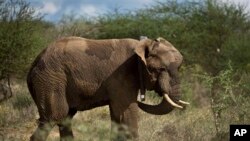Zimbabwe is proceeding with its plans to export elephants as the country struggles to cope with a growing herd.
National Parks Service and Wildlife Conservation Director, Geoffreys Matipano, says Harare will only sell to approved countries that have a good conservation record.
“We are looking at every country that is acceptable, that is suitable, that has been approved, a country that is following or abiding with CITES regulations; capture and transporting regulations, a country that is following international standards and veterinary standards,” said Matipano says in an interview with the VOA.
“Those are the countries we are going to deal with in terms of trade in elephants. It’s not just any country we are going to sell these elephants to – these are countries that have been approved, that have got a good record of proper wildlife conservation.”
With an elephant population of more than 80,000, Zimbabwe says it has been forced to sell some of its pachyderms, which are selling between $25,000 and $30,000 to address biodiversity degradation and human-wildlife conflicts. The elephant exports will help Zimbabwe raise badly needed funds for wildlife management. Zimbabwe currently has 80,000 elephants and Matipano says the country can only afford to keep at least 40,000.
“We are selling elephants primarily for conservation purposes,” said Matipano. “In Zimbabwe they are in excess in relation to the ecological carrying capacity. They are too many and they destroy the habitat and in turn affect biodiversity conservation. They destroy crops, they injure people, they kill people and we need to deal with this excess elephant population.”
Matipano did not reveal which countries Zimbabwe is currently looking to export the elephants but previous reports said China, France and the United Arab Emirates were lined up to receive about 60 elephants raising concern among conservationists about the conditions in which the animals, in particular how they were being kept before being transported to their new homes.
CITES, the international body that monitors endangered species, has said Zimbabwe can trade in live animals as long as the exports are not detrimental to the survival of the species. CITES also says the shipping of the animals should not expose them to injury or cruel treatment.
“We are a leader in conservation and we want to maintain this position and we are adopting some methods that are favorable, like capture and export to other acceptable approved destinations,” said Matipano.
“We need these animals – where they go, they must also survive and the remaining population should also survive. If we destock, it means the population that is remaining behind has got enough in terms of ecological resources.”
He said Zimbabwe is sending its experts, according to CITES regulations, to inspect facilities in the countries that will be receiving the elephants to ensure they are suitable to avoid unnecessary deaths.
Conservation groups, among them the Zimbabwe Conservation Taskforce, have petitioned the government over the exports expressing their concern on how the animals were being rounded up, the conditions they are being kept in before shipment and the quality of the places where they will eventually live.
“While we appreciate criticism, there are some people who have been criticizing for the sake of criticizing, maybe because they don’t like the receiving countries,” said Matipano.
“But we insist that we will not send our animals to unsuitable places. We will make sure that we capture animals during the appropriate season, particularly cool season where we don’t expose them to high temperatures so that they do not die.”
He said the capturing of the elephants is done by skilled veterinarians, adding they are then kept in facilities that meet international CITES standards before being transported.






